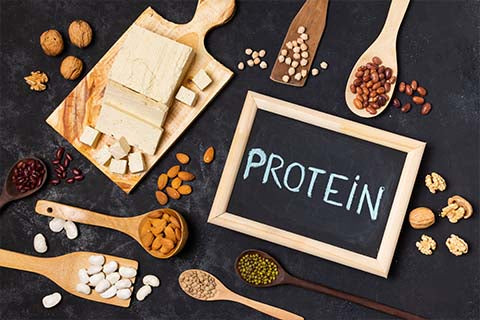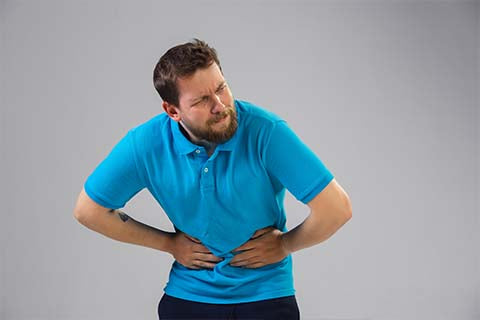September 22, 2023
Madhura Mohan
Side Effects Of Eating Too Much Protein For Weight Loss
I
n many facets of life, the adage "overdoing anything is wrong" holds true. Consider the simple act of watering plants. The plants will thrive if you water them appropriately for their size, climate, and water- holding capacity. Overwatering the plant can indeed harm the plant.
Protein almost always receives positive press, whereas fat and carbohydrates both have their fair share of detractors in the fitness community. Protein is a crucial nutrient for healthy bones, muscles, skin, and pretty much every other part of the body. It also fuels countless chemical processes that ensure your body works optimally. However, it doesn't follow that more is always better.
These days, a lot of people are turning to eating more protein in an effort to lose weight effectively. Unquestionably, protein is a necessary nutrient, but too much of a good thing can be harmful. We'll discuss how eating too much protein can tip the scales in this blog…
HIGH PROTEIN DIET

Adults should consume between 48 and 56 g of protein per day, or 0.8 g per kg of body weight, in order to prevent protein deficiency.
Although there isn't universal agreement on what constitutes a high-protein diet, most definitions place a cutoff between 1.2 and 2.0 g/Kg per day. Within this range, a high-protein diet is generally defined as one that contains more than 1.5 g/Kg of protein per day.
Let us first understand how protein supports weight loss goals
-
Protein diets reduce overall calorie intake by preventing excessive snacking because they take longer to digest than carbohydrates.
-
Your body burns more calories digesting protein-rich foods because protein has a higher thermic effect than carbs and fats.
-
Maintaining lean muscle mass during weight loss is important for maintaining a higher metabolic rate. Adequate protein intake can help with this.
SIDE EFFECTS OF CONSUMING EXCESSIVE PROTEIN
DIGESTIVE ISSUES

The digestive system can become overloaded by consuming too much protein, which can cause constipation, diarrhoea, and bloating. Specifically, when consumed in large quantities, protein-rich foods can be more difficult to digest. Diets that are high in protein and low in carbohydrates also tend to contain less fibre, which can cause digestive discomfort and irregular bowel movements.
KIDNEY ISSUES

The kidneys are in charge of removing wastes from the blood, including nitrogenous waste products like urea and creatinine, which are byproducts of protein metabolism. You produce more of these waste products than usual when you consume a high protein diet. As a result of having to work harder to process and eliminate these waste products, the kidneys may experience additional stress. As the kidneys adapt to the increased workload, filtration rates and other factors may change. Hyperfiltration may increase the risk of proteinuria. Increased protein intake has been repeatedly linked to increased uric acid excretion, decreased citrate excretion, and lowered urine pH—all risk factors for stone formation.
DEHYDRATION

It's possible that a high-protein diet causes dehydration. This will eventually cause you to urinate excessively, make you thirstier, and over time, it may also have an effect on your kidneys.
Your body needs to digest and get rid of urea and ammonia, which are byproducts of protein metabolism when you eat more protein. The kidney has to work harder to remove an excess of protein and nitrogen waste from metabolizing the protein and excreting it in urine, which leads to dehydration. Your kidneys may produce more urine to remove these waste products as your protein intake increases, which could result in more water loss.
BAD BREATH

Ammonia is one of the waste products that your body produces as it breaks down protein. When ammonia is released through your breath, it has a potent, unpleasant odour that can worsen bad breath.
The body may enter a state of ketosis when following high-protein diets, particularly those low in carbohydrates. When the body starts using fat that has been stored as energy to produce ketone compounds, this is when ketosis starts to happen. Ketones can have a distinctive smell that is frequently unpleasant and can worsen bad breath.
WEIGHT GAIN

Regardless of the macronutrient makeup, consuming more calories than your body requires will result in weight gain. A high protein intake needs to be balanced with an appropriate overall calorie intake. It's true that eating a high-protein diet can make you feel full, but if you overindulge, your weight may start to fluctuate as well. This is especially true if you consume an excessive amount of animal protein or drink too many protein shakes. Over time, eating too many extra calories—whether they come from fat, sugar, or protein—will make you put on weight.
DISORDERS OF BONE AND CALCIUM HOMEOSTASIS

Acid production in body fluids is significantly increased by high-protein diets. In response to this dietary acid challenge, the kidneys produce net acid excretion, and at the same time, the skeleton provides a buffer by actively resorbing bone, which causes excessive calcium loss. Additionally, acid loading directly prevents the reabsorption of calcium by the kidneys, causing hypercalciuria. Since bones contain 99.9% of the body's calcium, it makes sense that high protein intake, which causes hypercalciuria, would increase bone loss and increase the risk of osteopenia or fractures caused by broken bones.
Acid precursors are mostly present in animal foods. Calcium kidney stones may develop as a result of this protein-induced hypercalciuria.
LIVER ISSUES

Extremely high protein intake for an extended period of time may strain the liver and cause problems with the liver.
Ammonia is produced as a byproduct of protein metabolism. Ammonia is converted by the liver into urea, which is then eliminated by the kidneys. Extremely high protein intake can potentially stress the liver's detoxification functions by increasing the ammonia load on the organ. For those whose liver function has been compromised, this may be a problem.
Increased water loss through the urine as a result of high protein intake can result in dehydration. Liver function may be indirectly impacted by dehydration.
Finding the right balance of protein is crucial if you want to benefit from protein's weight-loss effects while avoiding any potential side effects...
A balanced diet will help you reach your weight loss goals and improve your general health, so moderation is key here…
Reference:



 Follow our Instagram page for the latest updates: badalkhudko
Follow our Instagram page for the latest updates: badalkhudko











Leave a comment